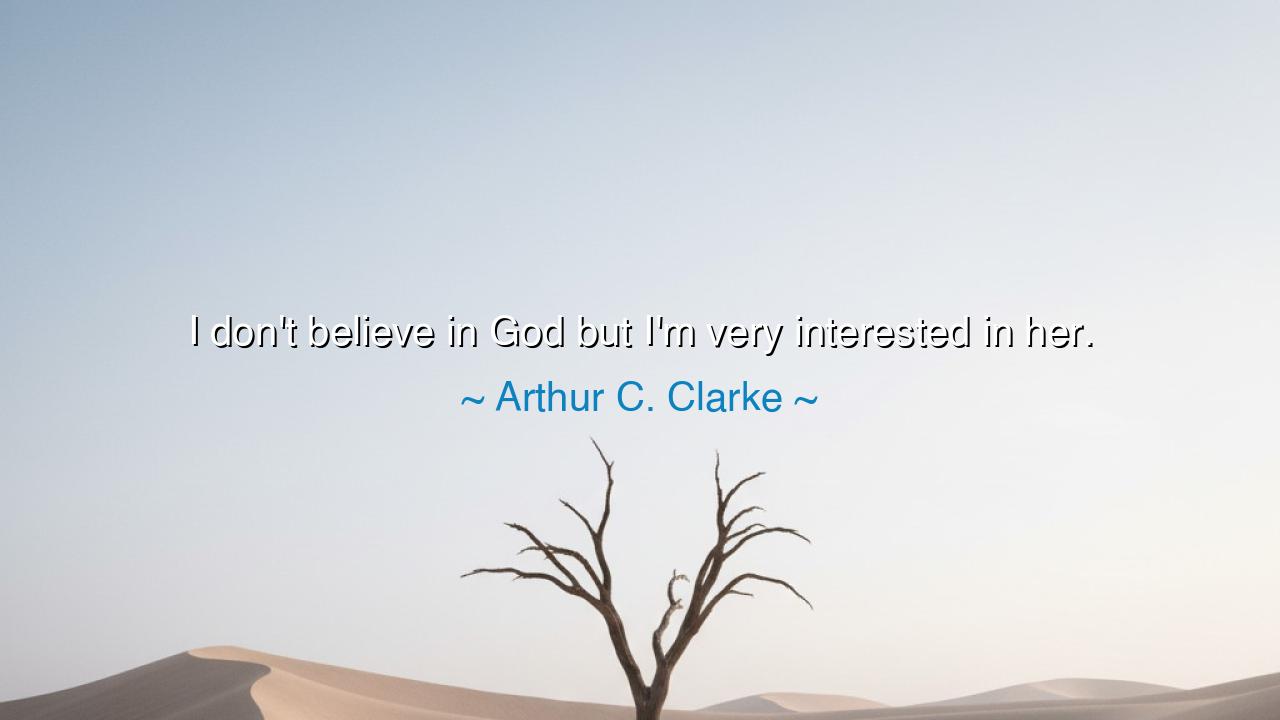
I don't believe in God but I'm very interested in her.






"I do not believe in God but I am very interested in her." — so spoke Arthur C. Clarke, a man who reached beyond the heavens with the mind of reason yet never ceased to dream with the heart of wonder. In this paradox, there lies a truth as ancient as the stars themselves: that belief and curiosity are not bound by the same laws. To believe is to accept; to be interested is to seek. And it is in the seeking that humanity finds its noblest form — the restless spirit that dares to look upon mystery without fear.
Clarke, who gave humanity the dream of satellites and far-seeing futures, stood as a bridge between science and faith. Though he named himself a skeptic, he bowed in awe before the infinite — not in worship, but in reverence. For to be “interested in God” is not merely to ponder divinity, but to pursue the essence of existence, the laws that cradle galaxies, and the whisper of meaning that drifts between atoms. His “her” was not a blasphemy, but a poetic defiance — a reminder that even in disbelief, there can dwell a sacred tenderness.
In the manner of the ancients, we may say: Clarke was like Prometheus, who stole fire from the gods not to dethrone them, but to bring light to humankind. He did not kneel before temples, yet he built his own — vast, invisible sanctuaries of thought stretching from the sea floor to the stars. To say, “I am interested in her,” is to gaze upon the unknown not as an enemy, but as a beloved mystery — to study the divine patterns woven through time without claiming to own them.
Consider the story of Hypatia of Alexandria, the philosopher who lived when faith and reason collided like thunder. She did not reject the gods of her time, nor did she bow before them blindly. She sought truth through observation, through numbers and stars, and through a love for wisdom itself. For this, she was destroyed by zealotry, yet her spirit endures. Like Clarke, she believed that to understand creation was to honor it more deeply than mere ritual ever could. Her death was tragedy; her legacy, revelation.
There is a lesson here for all who walk the earth beneath the silent constellations: one need not believe to be reverent. The quest for truth is itself an act of faith — not in gods, but in the capacity of the human soul to rise, to question, to wonder. To say, “I do not believe,” and yet to care, is to affirm that the sacred may dwell even in doubt, and that disbelief need not be barren but can bear the fruit of wisdom.
Let no man or woman think that faith and reason must war forever. The wise hold both in balance, like two wings of a single bird. One lifts the heart, the other guides the flight. When Clarke spoke of being “interested in her,” he invited us to walk the narrow bridge between the temple and the laboratory — to see that curiosity itself is divine, and that the universe does not shrink when we question it, but unfolds in greater majesty.
So I tell you, children of the future: be as Clarke was. Seek without fear. Let your disbelief be humble, your wonder unashamed. Kneel not before idols of stone nor before formulas of pride. Instead, walk with eyes open to the mystery that breathes through all things. For in the end, to be interested in God is not to define her, but to pursue the infinite beauty of existence — to listen to the eternal silence and find there the faint, trembling echo of your own soul.
And if you seek a rule to live by, let it be this: question bravely, love deeply, and remain curious. For the divine, whether real or imagined, reveals itself only to those who never cease to look.






AAdministratorAdministrator
Welcome, honored guests. Please leave a comment, we will respond soon